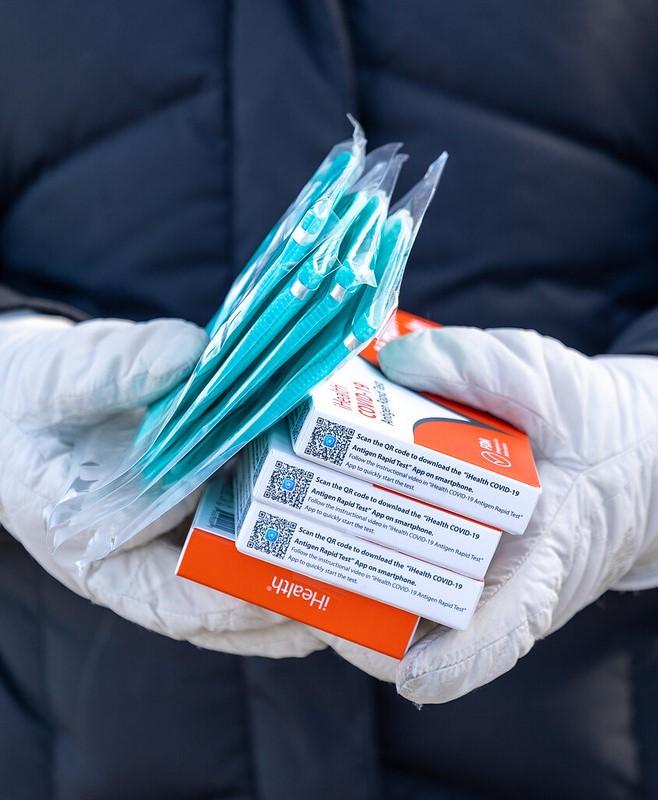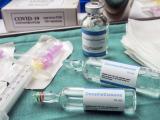As the pandemic presses further into its third year, US officials are working on overhauling the nation's strategy, and international officials are for the first time seeing COVAX vaccine supply exceed demand, casting a spotlight on the need to solve rollout problems in Africa.
Pandemic strategy on White House radar
Though White House officials are steeped in crisis talks regarding Russia's attack on Ukraine, efforts are under way to overhaul the nation's COVID-19 strategy, according to ABC News, which said the theme reflected a step-down in the urgency of the threat, now that vaccines, tests, and treatments are more plentiful.
Yesterday, Biden administration COVID-19 leaders met with pandemic experts in a private online forum to discuss how the pandemic might unfold and what preparedness steps to take, such as boosting supplies of treatments and untangling supply chain problems, according to ABC.
Before today's escalation in the Russia-Ukraine crisis, the White House had signaled that Biden might detail the nation's new approach in his Mar 1 State of the Union address.
The nation's COVID-19 cases continue to fall, with 84,793 new cases reported yesterday, a level similar to the days leading up to the start of the Omicron variant surge. Demand for COVID-19 vaccination is also falling, with the average number of Americans getting their first shot down to 90,000 per day, the lowest since the immunization campaign began, according to the Associated Press.
In other developments, data posted yesterday from the National Vital Statistics System on the maternal death rate during the first year of the pandemic showed an 18% rise, with the rate in Black women nearly three times higher than that for White women. The report was published on the Centers for Disease Control and Prevention (CDC) website.
Also, Los Angeles County—the nation's most populous county—yesterday announced that it would relax its mask mandate starting tomorrow for vaccinated people who show proof of immunization, according to the Los Angeles Times.
Demand softens for COVAX deliveries
In international developments, health officials involved with COVAX, the program designed to provide more equitable supply of COVID-19 vaccine to developing countries, are now reporting for the first time that supply has exceeded demand, according to Reuters.
As donations ramped up, COVAX in January had 436 million doses to allocate to countries, but nations have also asked for 100 million doses from the supply to cover them through May, according to the report.
A spokesperson from Gavi, the group that is managing the COVAX program, said rollout is a problem in a number of developing countries and that, to close the equity gap, more resources are needed to help the countries fully deploy their supplies.
World Health Organization (WHO) officials have warned that ignoring vaccine coverage gaps could be a factor that leads to the emergence of new SARS-CoV-2 variants.
A recent UNICEF survey that looked at the root causes of vaccine gaps in Africa found that some countries are still struggling with cold-chain capacity problems, suggesting that more support for infrastructure is needed. Also, communication glitches regarding deliveries have made it hard for some African nations to plan their vaccine campaigns, according to Reuters.
Sources also told the news service that more efforts are needed to improve communication about the importance of vaccination and to battle disinformation.
Cases high in Hong Kong, Korea
In other global developments, Hong Kong's cases today soared to a new daily high, with 8,798 new cases reported. Officials are introducing a vaccine passport required for some public spaces and have started construction on a new isolation unit for 10,000 on Lantau Island, according to Reuters.
Cases in South Korea today were above 170,000 for the second day in a row, and at a briefing, officials said the surge will likely peak in the middle of March, after which the country will review its physical distancing measures, according to the Korea Times.
Meanwhile, regarding the developments in Ukraine, WHO Director-General Tedros Adhanom Ghebreyesus, PhD, raised concerns over an escalating health crisis and said the health system must continue to deliver essential care.
In a statement, he said the WHO will monitor and report attacks on Ukraine's healthcare system, and he called for sustained and safe access to humanitarian assistance deliveries. Tedros said the WHO has released $3.5 million from its emergency contingencies fund to deliver urgent medical supplies to the country.





















